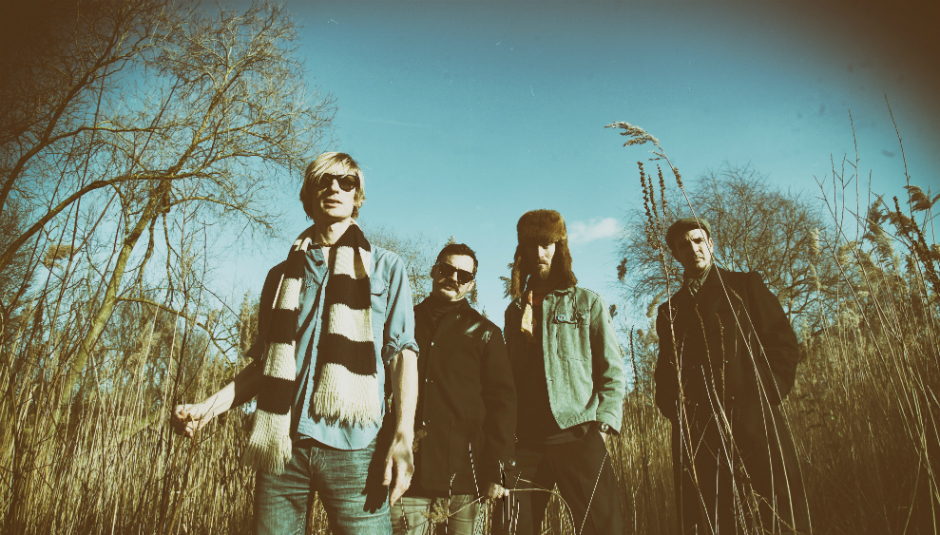This year, Kula Shaker release K 2.0 – a companion to their seminal debut, K, released in September 1996. At the time of this interview, I'm huddled in a quiet corner of a restaurant in New Delhi and I'm asking the Kula Shaker frontman to walk me through the story of K with 7000 kilometres between us.
I start by asking him to tell me about what it was like to release K twenty years ago. He makes an unconventional Blake reference, referring to Songs Of Innocence And Experience – a book he describes as “one of the great classics of literature.” In it, Blake walks the reader through the joys and perils of youthful naïveté.
“What does that have to do with K?” I ask.
“Innocence. We thought we were smarter than we were. We were speaking to these veterans of the music business and getting ripped off. You tell yourself: ‘It won't happen to me.’ You're young. But we were walking right into the lion's den. A nest of snakes. That was the innocence of our youth ploughing into the adult world.”
He continues, his memory of the spirit of the album as vivid as if it was released yesterday. “And it's an innocent album. It's an album that's asking questions, struggling with identity. It's an album that's looking for answers.”
K was – and still is – a landmark album. It reached me through Indian cable television the year it was released, but it wasn't until many years after that I learned that its reception in its home country was… mixed. I ask Mills what he feels the reason behind its criticism was.
“The musical styles on K are mainstream now. People didn't know how to understand it or where to place it when it was released, so all that was left to do was deride it. Before K, ‘Indian music’ was the music that played in the background when you were in an Indian restaurant. Before K, Krishna was an image on kitschy poster. It really changed us. More than acid, it was hearing about Krishna and going to India that changed us. Krishna is the unavoidable, inevitable karmic destiny. The crooked, unpredictable, divine lover. It's very personal. And K is based on very personal beliefs.”
Indian influences aside, K was born in the belly of Britpop and, while that could have worked against it, the album managed to turn the era to its advantage.
“Britpop was very much about being British. Bands really embraced and got off on that ‘We're British!’ sensibility. We weren't saying we were Indian or that we were British; there's a more universal identity on K. Theresa May said something like ‘A citizen of the world is a citizen of nowhere’. People are sceptical that there's a world out there without flags. We said that and people wanted to kill us. People are afraid of the concept of no flags.”
“When I was in private schools, they called me 'common', and when I was in state schools they called me 'posh'. It's made me very cynical about all these labels. Kula Shaker was born cynical, idealistic, and true. It's born in ancient traditions, the universality of sanatana dharma, jivan dharma, the identity of the soul. We have a lot of people against us who don't understand what we're about. I call it an ‘Accident of Chronology’; it was a moment that suited us. Its 60s obsessed, golden age of pop and rock aesthetic fitted quite well with our own.”
Regardless of how neatly it fitted the Britpop mould, K was something else. A band of four Brits turning Hindu mantras into 60s infused pop melodies was bound to stand out.
“We didn't make an effort to be different. We were different. We were learning music – I was learning sarod – and we were working with Himagsu Goswami, who was living in London, and his niece, Gouri, who sang on all the albums. A lot of our sound developed from playing unconventional gigs; we played squats, we played festivals – it wasn't just pubs and clubs. We weren't listening to the radio and saying: ‘Let's sound like them.’ We felt this was our destiny.”
The innocence and positivity on K lies in stark contrast to its cynical successor Peasants, Pigs And Astronauts – an album whose dystopian lyrics are just as applicable today as they were in 1999. I can't resist pointing out the dichotomy.
“Peasants, Pigs And Astronauts is the apocalypse and the aftermath. It's us having fun with the idea of the millennium,” he tells me. “There was angst in K. But it bore fruit in Peasants, Pigs And Astronauts.”
Kula Shaker never really revisited their sound on K. Their style changed across each successive album, seemingly moving away from the band's original aesthetic. I ask if there's any chance we can expect a return to their roots in the future. The closest we'll get, I learned, is the release of their first live album.
“It's something we've struggled with in the past. We've struggled to bottle the magic and excitement of a live show in a recording. So we booked a studio in East London and played a show to a few hundred people. This was in May this year. The sound and the atmosphere were great. The album's going to be called Live In The East (End).”
I ask, and he lets me in on a secret around K's recording. “We weren't crazy about how the album was sounding, originally. We originally recorded it with John Leckie. We were huge fans of his work, but we weren't huge fans of the outcome when we first heard K; we were disappointed. Our manager told us to stop being such perfectionists. We'd recorded a version of ‘Shower Your Love’ that they wanted to release. No one's heard it yet.”
“We had to record the B-sides in a small studio. ‘Drop In The Sea’, ‘Dance In Your Shadow’ – that's where we recorded them. Stephen Harris was at the recording session and we ended up taking a lot of the Leckie tracks off the record.”
A lot has changed in twenty years, and if the music industry was a lions' den/snake pit then, would K have survived today?
“The music business, and the way it works, used to be much more focused. Not only was it signing bands but it was also simpler to navigate in terms of the ways you could promote a band. But now you have this ocean of content – the Internet – that everyone is drowning in. It's difficult for music to get through. And whatever does get through has a vanilla taste to it. So I think K would struggle, but you never know. K didn't fit with Britpop either.”
“As for downloading music – it works, it's easy. But just because something is easy doesn't mean it's right. It's just as difficult for a band today to make it and there's so much less support from record companies. Musicians have to be part-time, and there's a huge sacrifice to be made if you have to live that life. Not many people can tour like that. You have to be a bit mad and very clever to make it.”
I've caught Mills just ahead of Kula Shaker's tour of Japan and the UK. “K is an album that was designed to be heard in one go,” he tells me. “When we're on tour in Japan and the UK, we're going to be playing it in its entirety.” He doesn't see me nod and plan my trip to London. I ask him how the shows are doing, and to tell me about the people who come see them play.
“Our fans are pretty devoted, and I'm always amazed. We did a concert in LA – we hadn't played there in 15 years, so we didn't know if anyone would remember us. But they were such exciting shows – we're so grateful to have those fans. We're very grateful for the people who've stuck with us – the kids, now maybe their kids. The band certainly means something to the fans.”
At 9 years old, when I first heard K, I thought it was beautiful. At 29, it’s still beautiful. I'm not yet tired of the chaotically spiralling guitars on 'Tattva', and 'Govinda' still manages to soothe me at my most savage. The strings that open 'Hollow Man (Part 2)' are exquisite enough to have generously 'inspired' Radiohead (cough 'Faust Arp' cough), while 'Start All Over' is as sweetly romantic today as it was then. And then there’s '303', whose whirlwind cityscapes and unrestrained recklessness can still melt my cold, dead heart.
The 20th Anniversary Edition of K is out now via BMG, and Kula Shaker are currently on tour in the UK and Japan. For more information, visit the band’s official website.






















